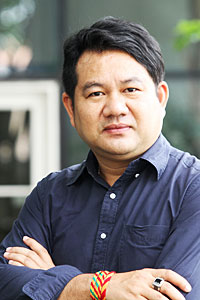
The regime is shutting off people from political participation in refusing to completely lift the ban on political activity. It still deprives people of their rights to have access to information about how they can engage in conversation with and join a political party and how they will benefit from its policies.
The countdown to the election scheduled to take place on Feb 24 -- at the earliest -- has begun but the regime is seen as unwilling to return power to the people. What is it so scared of?
The government said on Tuesday it planned to only partially lift the ban on political activities.

Anucha Charoenpo is news editor, Bangkok Post.
Activities that will be allowed after the ban is partially eased include party meetings to select executives and recruit members; giving opinions on the demarcation of constituencies; conducting primary votes to choose poll candidates; setting up committees to select poll candidates; and contacting party members.
However, under the partial ban, party executives are neither permitted to formally release their campaign platforms nor introduce policies to their voters.
This shows the junta is still shutting the door on politicians carrying out campaigning and simultaneously shutting out people's views on their policies and platforms.
In my view, the regime is shutting down the debate to prevent arguments getting too heated. It also warned politicians not to use their social media networks for election campaigns until after the organic law on MP elections becomes law. Temples nationwide cannot be used as an assembly venue for politicians to carry out election campaigns.
The partial lifting of the ban is making politicians and the regime's opponents very unhappy.
Over the past week, they have repeatedly demanded the regime make clear what activities they can carry out without breaking the law. They insisted the ban be completely lifted, not just partly, giving all parties a level playing field ahead of the polls.
I wonder how people will perceive and understand their policies if the regime still does not permit parties to talk to voters. We have only six months left before polling day if it is in line with the roadmap to election.
As a voter, I'm curious to know what are the bread-and-butter issues of each party that will affect my daily life such as the cost of living and taxes? What are their solutions to the problem of traffic jams in Bangkok?
And I'm interested to know what they will propose to solve problems in the far South? How are politicians committed to tackling domestic and family violence?
So, the military should free up more space for politicians and their voters to exchange ideas and encourage them to debate political issues.
The junta has been able to return peace and order to the country since it staged the coup on May 22, 2014. So, it is time for it to return power to voters, permitting us to carry out activities more freely.
No one has lost lives or property such as they did in the political violence in Bangkok and many parts of the country before the coup.
What I have noticed is that there are only certain situations in which pro-democracy groups and anti-junta groups criticise each other in public because they disagree seriously about something related to politics.
Prime Minister Prayut Chan-o-cha, in his capacity of chief of the National Council for Peace and Order (NCPO), invoked Section 44 of the interim constitution and exerted his power to deal with problems facing the country.
Gen Prayut has taken complete control of the kingdom and used laws and NCPO orders as a key tool in maintaining peace and order.
The regime called critics who spoke out against it and the prime minister to attend an "attitude adjustment" detention programme, hoping they would change their negative attitudes towards the regime. But I doubt being kept in an army camp for a mere few days will be enough to alter their views.
Obviously, the military has been making efforts to keep criticism of the its administration to a minimum. Anti-regime people feel extremely annoyed by what has happened since the coup.
If the regime has nothing to hide, it has nothing to fear either. It is not too late to change its mind about totally lifting the ban on political activities, returning space for political debate. In fact it will be much wiser.
